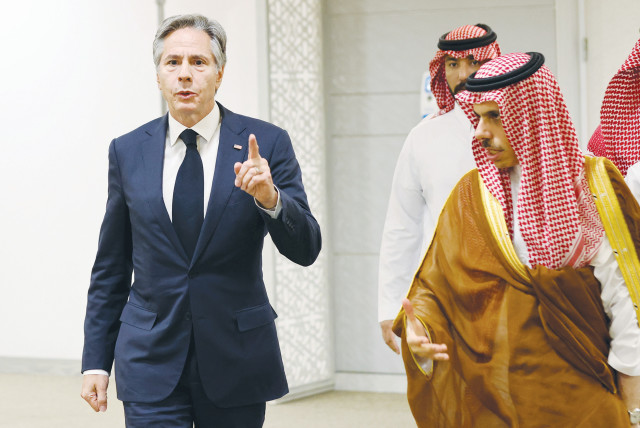Saudi-US ties are under the spotlight - opinion

Saudi Arabia’s economic interests come before partnerships and strategic alliances with major powers, especially the US, given the recent circumstances in their relationship.
Lately, I have been following many media reports about how Saudi Arabia’s decision to extend oil production and export cuts until the end of this year affects its relations with the US. These two countries have recently resumed dialogue and communication on several issues, especially the normalization of relations with Israel.
Saudi Arabia’s oil production and export policy depends on various factors and calculations. Some of them relate to the global market and how to maintain fair price ceilings by regulating supply and demand. Others relate to Saudi Arabia’s strategic interests and revenue needs for its budget. These are economic rather than political calculations – and I think this “message” has reached US decision-makers, along with confirmations that there is no backing down from the policy.
Saudi Arabia’s economic interests come before partnerships and strategic alliances with major powers, especially the US, given the recent circumstances in their relationship.
Oil-producing and exporting countries, especially major players in the global market, have no interest in increasing global inflation rates due to rising energy costs. This harms economies, manufacturing, and global demand for this strategic commodity. However, conversely, these countries want to avoid prices diving to levels that do not meet their development plans and budgets.
The concerns of the United States are not only about the increase in oil prices. They also include the growing strategic cooperation between Saudi Arabia and Russia, especially as regards coordinating oil policies. Despite this, the US has increased the price of the gas it exports to its European allies instead of their preferred Russian gas, causing significant disruption to their economies.
In light of this, it is hard to ignore the dilemma that the White House and President Joe Biden face as he seeks a second presidential term while rising energy prices coincide with the upcoming election year. Higher inflation and fuel prices have become two main targets for the GOP campaigns against the Democrats.
Saudi US ties note whole, but on the mend
The evidence suggests that Riyadh and Washington have not fully restored their relations. Although they have overcome the critical phase of tension that marked their relations in the past few years, they are still undergoing a realignment phase, or setting new rules for their alliance/partnership, in line with Saudi Arabia’s new strategic vision. This vision, especially as advocated by Prince Mohammed bin Salman (MBS), the Saudi crown prince, is based on diversity and on maximizing Saudi Arabia’s returns from partnerships and strategic alliances built on dynamism, mutual interest, and benefit.
This was evident in the famous fist bump between MBS and the US president during the latter’s visit to Saudi Arabia in July 2022. It is worth noting that there has been significant momentum in meetings and visits of senior officials from both countries in recent months, indicating a shared conviction of reaching a comprehensive agreement on all security, military, nuclear, and political issues on their common strategic dialogue agenda.
All of this does not deny that the US may have accepted what has happened in its relations with the Gulf and Middle Eastern allies. It may be leaning toward accepting the current situation, especially given these allies’ positions on the Ukraine war and the coups in Africa, which have strategic implications that favor Russia and China. This may reinforce the notion, among American decision-makers, of adopting realism in dealing with Middle Eastern allies and keeping them amid the intensifying competition and conflict, among major global powers, for dominance and influence in the post-Ukraine war era.
Overall, it is hard to tell whether Saudi-US relations are heading toward new tension, due to energy prices. It is also hard to tell if Washington can ignore this issue in managing its relations with Riyadh. However, the new question is how both sides can reach a common understanding that serves their mutual interest.
Throughout all of this, we must always remember that the change of residents in the White House is a significant variable in these historical relations. Relations with Saudi Arabia are a point of contention in Democratic-Republican conflicts, both in Congress and at the presidential level in elections and real-world political practice.
We should also remember that the energy price issue, despite its high strategic importance for both parties, is just one aspect of their partnership, not the most important one. Therefore, no matter what differences arise due to this issue, matters tend to return to their normal state gradually, especially if they reach new agreements and understandings regarding the rest of their relations.
The writer is a UAE political analyst and former Federal National Council candidate.
Jerusalem Post Store
`; document.getElementById("linkPremium").innerHTML = cont; var divWithLink = document.getElementById("premium-link"); if (divWithLink !== null && divWithLink !== 'undefined') { divWithLink.style.border = "solid 1px #cb0f3e"; divWithLink.style.textAlign = "center"; divWithLink.style.marginBottom = "15px"; divWithLink.style.marginTop = "15px"; divWithLink.style.width = "100%"; divWithLink.style.backgroundColor = "#122952"; divWithLink.style.color = "#ffffff"; divWithLink.style.lineHeight = "1.5"; } } (function (v, i) { });

